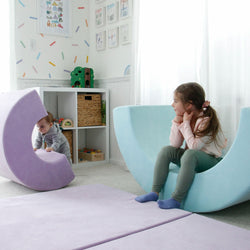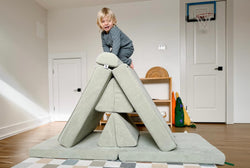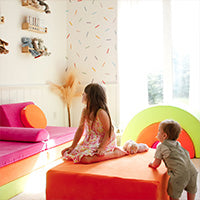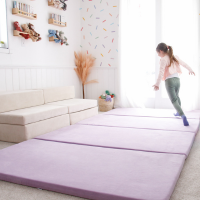Creativity That Lasts Beyond the Screen
The Science-Backed Benefits of Modular Play Couches

Let’s be real…keeping up with kids’ energy can feel like a full-time job. I remember constantly searching for activities that weren’t just screen time. That’s when we discovered the modular play couch.
At first, it seemed like just another piece of furniture. But quickly, it became so much more, a foam play couch that doubles as a fort, obstacle course, rocket ship, and a science-backed tool for child development.
Why a Play Couch Is More Than “Just a Toy”
The American Academy of Pediatrics (AAP) says unstructured, imaginative play is one of the best things you can do for your child’s brain and social skills. Unlike electronic toys that dictate how kids play, a modular play couch gives them freedom to build, climb, balance, and invent.
This kind of open-ended play fuels executive function, creativity, and self-regulation, skills linked to long-term success in school and life.
1. Motor Skills: Active Play Indoors

When my kids pile cushions into a mountain, it looks like chaos…but really they’re building balance, strength, and coordination.
-
Gross motor skills: Jumping, climbing, crawling, and balancing build strength, coordination, and body awareness.
-
Fine motor skills: Fitting pieces together, adjusting covers, and arranging cushions strengthen dexterity and hand-eye coordination.
Research shows physical play develops both large muscle strength and fine motor control. With a play couch, it’s a safe, screen-free way to keep kids moving indoors.
2. Language Growth Through Pretend Play

Did you know that talking to a stuffed animal in a “couch pirate ship” builds real language skills?
A meta-analysis of 35 studies found a clear link between symbolic play and language development. Kids who imagine, narrate, and role-play while building a kids couch fort grow vocabulary, sentence complexity, and social communication skills.
That silly fort conversation? It’s also laying the foundation for storytelling, confidence, and cooperation.
3. Creativity That Lasts Beyond the Screen
 One day it’s a rocket ship, the next it’s a spa for stuffed animals. That’s the magic of a modular play couch.
One day it’s a rocket ship, the next it’s a spa for stuffed animals. That’s the magic of a modular play couch.Psychologists call this divergent thinking, finding multiple solutions to one problem. Research shows that open-ended materials like foam blocks and cushions foster:
-
Greater creativity in problem-solving tasks
-
More persistence and resilience
-
Richer imaginative storytelling
Parents often say the foam play couch is the one toy their kids never get bored of.
4. Executive Function: Problem-Solving in Action

Executive function is like the brain’s air traffic control system, it manages memory, focus, and self-control.
When a fort collapses, kids don’t just give up. They problem-solve, rebuild, and test new ideas. When they argue over who gets to be “queen,” they’re practicing negotiation and compromise.
Studies show executive function and complex play strengthen each other. Even structured play programs boost EF, language, and motor skills (Gibb et al., 2021).
Why Parents Love Modular Play Couches
 Parents aren’t just buying another piece of furniture…they’re investing in a tool that grows with their kids.
Parents aren’t just buying another piece of furniture…they’re investing in a tool that grows with their kids.From toddler climbing practice to tween reading nooks, the benefits of a play couch stretch across every stage of childhood. And with certified safe foam and durable covers, they’re built for long-lasting peace of mind.
For many families, a play couch becomes the heart of their living room, where play, creativity, and connection happen daily.
Want to see more builds? Explore our collection of modular play couches here → The Joey Collection
FAQs About Play Couches
What age is a modular play couch best for?
Play couches are great for toddlers through tweens. Younger kids climb and explore, while older kids turn them into forts, reading corners, creative builds, or simply a comfy spot to hang out with friends.
Are foam play couches safe?
Yes, high-quality play couches are made with certified safe foam and durable, machine-washable covers. Always check product safety certifications.
Do kids really use them long-term?
Absolutely. Because they’re open-ended, kids reinvent their play couches over and over. Families often say their children use them daily, even years later.
Final Thoughts
At the end of the day, a play couch is more than a toy, it’s a launchpad for imagination, growth, and connection.
Backed by research and loved by families, it helps kids build motor skills, language, creativity, and problem-solving abilities they’ll carry for life.
And the best part? To them, it’s just pure fun.
Keep building memories (and forts).
— Matt, Roo & You’s Master Builder
P.S. Want to see how other families are building with their play couches? Join 36,000+ Roopers in our VIP group
About MattMatt Smith is Roo & You’s resident Master Builder—both at home with his three kids and in the world of modular play furniture. A dad who loves fun facts, fitness, and the occasional dad joke, Matt brings a parent’s perspective and a science-backed curiosity to everything he writes.
Want to dig deeper? Here are the studies that inspired this article.
The Power of Play: A Pediatric Role in Enhancing Development in Young Children (AAP, 2018)
The Importance of Play in Promoting Healthy Child Development and Maintaining Strong Parent-Child Bonds (AAP, 2007)The Relationship Between Children’s Indoor Loose Parts Play and Cognitive Development: A Systematic Review (Cankaya et al., 2025)
Preschool Children’s Loose Parts Play and Cognitive Flexibility (Cankaya, 2023)
Executive Function Predicts the Development of Play Skills (Faja et al., 2016) The Physical Play and Motor Development of Young Children: A Literature Review (Trawick-Smith et al.)Quinn, J.M., Donnelly, S., & Kidd, E. (2018).






Leave a comment